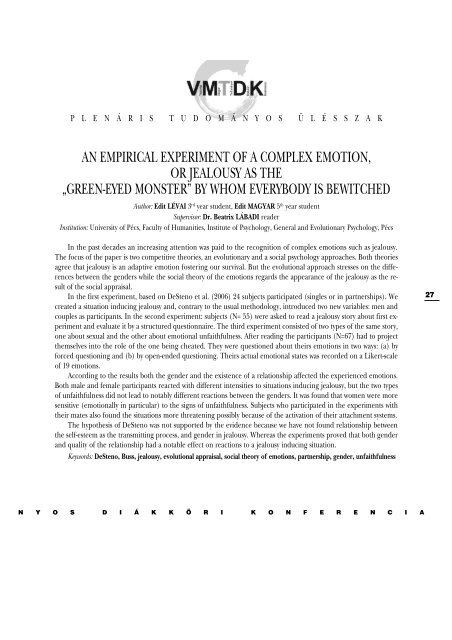Rezümékötet 2008. - vmtdk
Rezümékötet 2008. - vmtdk
Rezümékötet 2008. - vmtdk
Create successful ePaper yourself
Turn your PDF publications into a flip-book with our unique Google optimized e-Paper software.
P L E N Á R I S T U D O M Á N Y O S Ü L É S S Z A K<br />
AN EMPIRICAL EXPERIMENT OF A COMPLEX EMOTION,<br />
OR JEALOUSY AS THE<br />
„GREEN-EYED MONSTER” BY WHOM EVERYBODY IS BEWITCHED<br />
Author: Edit LÉVAI 3 rd year student, Edit MAGYAR 5 th year student<br />
Supervisor: Dr. Beatrix LÁBADI reader<br />
Institution: University of Pécs, Faculty of Humanities, Institute of Psychology, General and Evolutionary Psychology, Pécs<br />
In the past decades an increasing attention was paid to the recognition of complex emotions such as jealousy.<br />
The focus of the paper is two competitive theories, an evolutionary and a social psychology approaches. Both theories<br />
agree that jealousy is an adaptive emotion fostering our survival. But the evolutional approach stresses on the differences<br />
between the genders while the social theory of the emotions regards the appearance of the jealousy as the result<br />
of the social appraisal.<br />
In the first experiment, based on DeSteno et al. (2006) 24 subjects participated (singles or in partnerships). We<br />
created a situation inducing jealousy and, contrary to the usual methodology, introduced two new variables: men and<br />
couples as participants. In the second experiment: subjects (N= 55) were asked to read a jealousy story about first experiment<br />
and evaluate it by a structured questionnaire. The third experiment consisted of two types of the same story,<br />
one about sexual and the other about emotional unfaithfulness. After reading the participants (N=67) had to project<br />
themselves into the role of the one being cheated. They were questioned about theirs emotions in two ways: (a) by<br />
forced questioning and (b) by open-ended questioning. Theirs actual emotional states was recorded on a Likert-scale<br />
of 19 emotions.<br />
According to the results both the gender and the existence of a relationship affected the experienced emotions.<br />
Both male and female participants reacted with different intensities to situations inducing jealousy, but the two types<br />
of unfaithfulness did not lead to notably different reactions between the genders. It was found that women were more<br />
sensitive (emotionally in particular) to the signs of unfaithfulness. Subjects who participated in the experiments with<br />
their mates also found the situations more threatening possibly because of the activation of their attachment systems.<br />
The hypothesis of DeSteno was not supported by the evidence because we have not found relationship between<br />
the self-esteem as the transmitting process, and gender in jealousy. Whereas the experiments proved that both gender<br />
and quality of the relationship had a notable effect on reactions to a jealousy inducing situation.<br />
Keywords: DeSteno, Buss, jealousy, evolutional appraisal, social theory of emotions, partnership, gender, unfaithfulness<br />
N Y O S D I Á K K Ö R I K O N F E R E N C I A<br />
27




